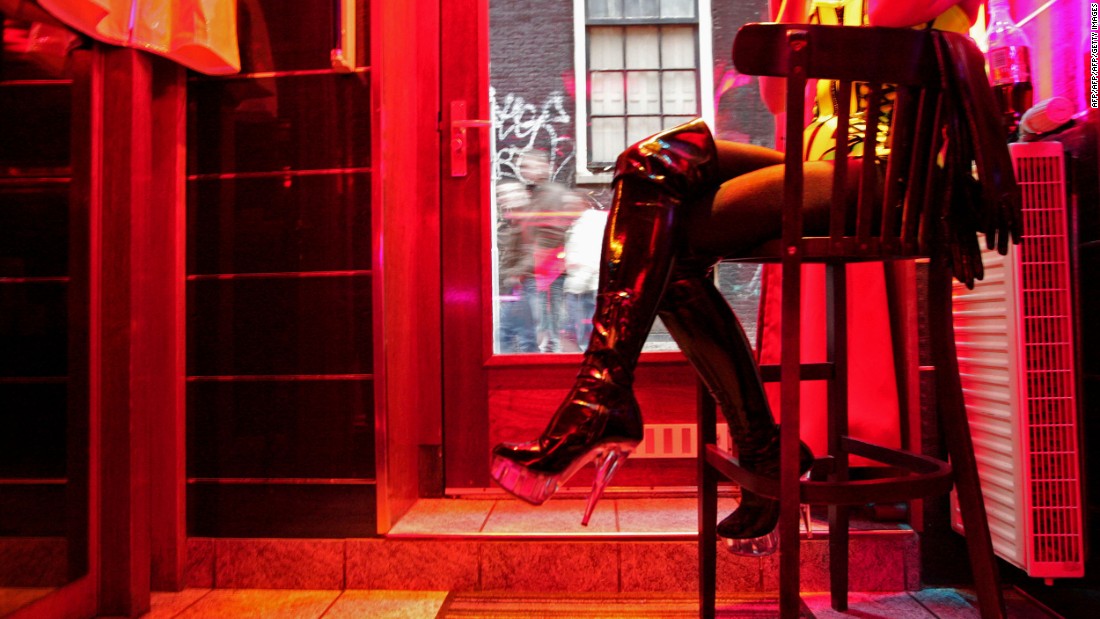(CNN) — When the Netherlands introduced lockdown measures in mid-March, Amsterdam’s Red Light District transformed into a ghost town overnight. Coronavirus dealt a devastating blow to the Dutch capital’s notorious window brothels and left over 300 legally operating sex workers without an income for almost four months.
The district in Amsterdam’s historic center, known locally as De Wallen, relies heavily on tourism and normally attracts over a million visitors a month. The pandemic plunged the sex industry into deep financial trouble and reignited a debate about the future of the Red Light District.
When the lockdown began, many sex workers chose to return to their home countries in eastern Europe, according to Felicia Anna, a Romanian sex worker and founder of Red Light United, a trade union representing 110 women. Many of those who stayed worked illegally. “They had no other option,” says Anna.
Although sex workers were eligible for government financial aid as they pay taxes, the monthly grant of €1,100 (about $1,250) was not enough to cover their expensive living costs in the city center, according to Anna.
“I had seven appointments with clients the week the lockdown started. They were all gone in one day. That first week I missed about €1,300 of income. Then I stopped counting,” says Anita, a 56-year-old sex worker whose name has been changed to protect her identity.
Brink of bankruptcy

Amsterdam’s mayor wants to relocate the city’s sex industry out of town.
Dean Mouhtaropoulos/Getty Images
“Some girls have quit (the industry). They were scared of the risk of Covid-19 infection and the general insecurity about income,” says Eric Hamaker, owner of Red Light Tax, a bookkeeping firm that handles the finances of many sex workers.
The Dutch government gave the green light for brothels to reopen at the start of July after originally announcing that they would stay closed until September.
“If it had been September, I would have had to look for another job and many brothel owners and window renters would have gone bankrupt,” says Anita, who works with disabled clients and runs tours at the Prostitution Information Center.
Sex workers are encouraged to ask their clients whether they have Covid-19 symptoms. New hygiene measures include washing hands, extra showering, no kissing and limiting face-to-face contact.
“Without tourism it will be impossible for the number of girls that were working previously to make a decent income,” says Hamaker. At least 70% of the district’s revenue comes from tourism.
‘Tourist Disney world’

Closure of the Red Light District during virus lockdown pushed many sex workers to the brink of bankruptcy.
Dean Mouhtaropoulos/Getty Images
Amsterdam has been struggling with mass tourism for years, alongside increasing discontentment among residents about loud noise, littering and unruly behavior from tourists.
Emboldened by the sight of empty streets and the calm atmosphere during lockdown, residents living in the city center are calling for change.
More than 30,000 residents have signed a petition titled “Amsterdam has a choice,” which urges city authorities to improve the quality of life for residents in the center and restrict the annual overnight tourist stays to 12 million. Last year the total stood at 18.8 million.
“During the lockdown you saw that people rediscovered their city. (They also saw) how dependent the inner city economy has become on tourism,” says Martijn Badir, a policy economist who started the petition. “We are not against tourism, but the city council should do more to create a better balance between local residents and tourists and (think) about what type of image we want to portray as a city after this crisis,” says Badir.
“Amsterdam residents are hoping it will not return to the tourist Disney world that we had before,” adds Hamaker.
The city council declined to comment.
Sex workers say their industry has been unfairly singled out as the root of the problem. “The sex workers are not the cause of the disturbance. The bachelor parties are the problem and the fact that EasyJet flights are so cheap,” says Anita.
They say that reforming the Red Light District will not solve the issue of overtourism.
“Tourists are going to visit anyway. You can’t stop tourism unless you put a wall around Amsterdam,” says Anna.
Prostitution hotel

Tourists account for 70% of business in Amsterdam’s Red Light District.
Dean Mouhtaropoulos/Getty Images
Before the lockdown, Amsterdam Mayor Femke Halsema was already considering a major overhaul of the Red Light District in a bid to reduce disruptive behavior and protect the sex workers from degrading conditions. In May, she said that the pandemic has highlighted the “urgency to think about the city center of the future.”
Halsema has presented four scenarios for the district, which range from reducing the number of brothel windows to moving sex workers to a new location.
She has also suggested opening a “prostitution hotel” outside the center and said in May that the search for a new location was well under way. The council will hold a vote on the scenarios after the summer, a spokesperson told CNN.
New rules have already been introduced. Tour guides are no longer allowed to stop in front of the windows and tourists are banned from taking pictures of the sex workers.
Sex workers fear the district will be closed down and that they will be moved to a remote location outside the city center.
“That would be extremely dangerous. When you leave your shift at 5 a.m., the robbers will be lining up,” says Anita. “We don’t want to move into a prostitution hotel. Here everyone can see us. That’s what makes our jobs safe.”
They also worry about the impact moving elsewhere will have on their income as they rely heavily on walk-in tourists.
The current situation provides city authorities with a good opportunity to push through reforms, says Hamaker.
“Window owners are in a vulnerable position. They are scared to lose their livelihoods. There are already options on the table to buy out current owners,” he says.
